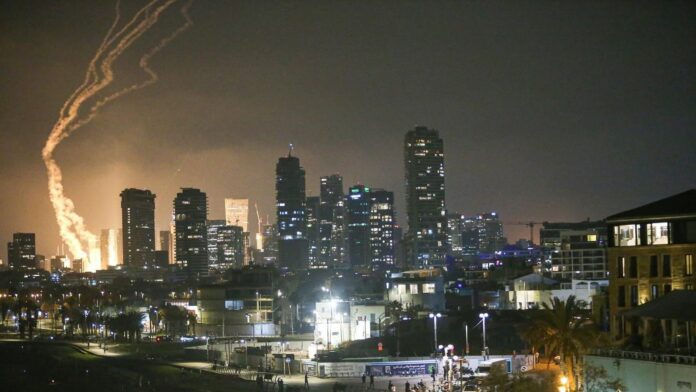Iran launched a large-scale missile and drone operation on June 13, 2025, striking multiple locations across Israel. The attacks, described as one of the most extensive assaults Israel has faced in recent years, reached key urban areas including Tel Aviv and Jerusalem, triggering emergency alerts and sending thousands into shelters.
According to official reports, Iran deployed over 100 ballistic missiles and a significant number of drones in a carefully coordinated response. Several of the projectiles reportedly evaded Israel’s advanced air defense systems, resulting in direct hits in densely populated districts such as central Tel Aviv and Ramat Gan. Israeli authorities confirmed multiple injuries and damage to infrastructure, though the full extent of the impact is still being assessed.
The missile launches followed Israeli strikes on Iranian military and nuclear-related sites earlier this week. Although Israel had claimed operational success, the events that unfolded demonstrated Iran’s capability to respond swiftly and reach targets far beyond its borders. Tehran framed the missile attack as a defensive action aimed at protecting its sovereignty and regional stability.
Iranian officials emphasized that the country’s military response was proportionate and necessary, underscoring a message that no hostile action would remain without consequences. Supreme Leader Ayatollah Ali Khamenei stated that Iran would continue to safeguard its national interests, while the Iranian public largely viewed the retaliation as a justified move in the face of external threats.
In Israel, the sudden reach of Iranian missiles into strategic areas prompted questions regarding the resilience of the nation’s security structure. Despite significant investments in multi-layered air defense systems, Iran’s ability to penetrate these defenses highlighted new vulnerabilities. Israeli leadership announced that military operations would continue, signaling a likely prolongation of the confrontation.
The wider international community closely monitored the developments, with rising concerns over the potential for further regional destabilization. While both sides maintain strong public positions, the incident revealed the shifting dynamics of deterrence in the Middle East. Iran’s ability to directly impact Israeli cities has introduced a new reality that could influence future engagements across the region.
Although presented as a reciprocal response, Iran’s missile strike carried broader implications. The events served as a reminder that no nation, regardless of its military capabilities or alliances, is immune to reaching points of strategic exposure. The unfolding situation may reshape long-standing assumptions about power balance and security in the Middle East.

